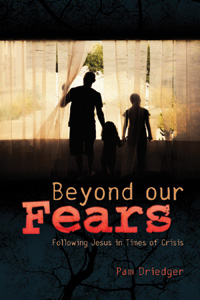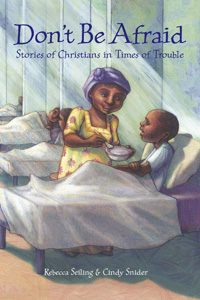Ebola. The word alone in a news headline is enough to make me want to click and read more.
And the media certainly know how to play off my fears. All they have to do is insert the word crisis and they know they’ve got me.
I live in suburban Ohio, between Cleveland and Akron—very close to the area where Dallas nurse Amber Vinson visited last weekend before she was diagnosed with Ebola. A few area schools have been closed and cleaned “out of an abundance of caution”; a bridal store she visited has been closed; and Vinson’s friends and family who had direct contact with her are being quarantined for 21 days (including three who work on the same college campus as my spouse). My husband got a notice about it at work, my younger daughter’s daycare sent home a notice, the pediatrician asked about possible exposure when I called to make an appointment, there’s a countywide Ebola hotline, the list goes on.
It feels to me like level of panic in this area is at an all-time high.
I don’t want to bury my head in the sand here and skip the news altogether, but I also need to be realistic: it’s more likely at this point that I’m going to die from a car accident or the flu than Ebola. There is a very real Ebola outbreak, but right now it’s in West Africa.
How do I manage my own personal fears while also working to help solve the problem? This was my quandary late last week when I remembered a series of resources MennoMedia developed a few years ago about pandemic preparedness.
Back in 2009, medical authorities were warning that the world was due to suffer a flu virus on a global scale, equal to or greater than the international pandemic of 1918. They warned that, despite our advanced medical technology, thousands of people would die and many more would become sick. People would fear for their health. Naturally, people would want to protect themselves.
So we at MennoMedia considered: How would the church respond to a pandemic? Do we have a plan? Will we retreat in fear, or are we ready to be God’s light in the midst of suffering?
We developed a series of pandemic preparedness resources. It has three parts:
- Beyond Our Fears: Following Jesus in Times of Crisis ($5.99 USD/$6.59 CAD)
- Beyond Our Fears: Guide for Leaders ($12.99/$14.29 CAD)
- Don’t Be Afraid: Stories of Christians in Times of Trouble (Inspiring stories of Christians who responded faithfully when faced with crisis will help children understand that they can call on God in all situations; for children ages 9-12; $5.99 USD/$6.59 CAD)
 |
 |
 |
The Beyond Our Fears guide is designed to be part of a congregational study series, but it can also be a personal resource for inspiration and learning.
This series was written not to raise our fears, but to do the exact opposite: to prepare the church to shine as God’s light in the midst of such crises, to respond to our call to be people of healing and hope. Even if these crises never occur, the resources (especially the ones for adults) will help us think through our mission as Christians and how God calls us to join the work of healing and hope in our families, neighborhoods, and world.
Most of us would rather not think about worst-case scenarios such as Ebola in Ohio (or anywhere else, for that matter), a new flu pandemic, or devastating hurricanes or tornadoes. But governments and municipalities are creating plans to be prepared for each of these crises. So shouldn’t we, as ordinary people of faith, be spiritually prepared? Why not know before the crisis what kinds of actions and attitudes are most consistent with our faith? Why not think together about how is God calling us to be good stewards of the future? Let’s face it: crisis has always been a fact of human existence on this planet, and it can hit without warning.
Because these pandemic preparedness resources are perfect for such a time as this, MennoMedia is offering 20% off any of the three titles this week. Just use code BEYOND14 at checkout. I encourage you to take advantage of the sale and to consider these issues with your congregation.
Now to part 2: the matter of stopping and controlling Ebola in West Africa. There are so many inspiring stories of what’s being done in Africa. But, as experts warn us, more work needs to be done to contain and control this virus. Dollars are needed—quickly—to aid in this work. In the last week on the news or in my Facebook feed, I’ve heard of people giving to the following organizations. Click on the name of the organization to make your own contribution.
- Doctors Without Borders. This group has been on the frontlines, and last week I saw a Facebook post inviting people to leave comments of support and encouragement for the medical teams hard at work. Here’s a link where you can post your words of support.
- The Global Disaster Response Fund of the Centers for Disease Control and Prevention. Last week Facebook’s Mark Zuckerberg and his wife Priscilla Chan donated $25 million to this fund to fight Ebola. Read more here.
- IMA World Health. Mennonite Central Committee belongs to this larger Christian organization and recommends them.
- Unicef.
- World Vision.
- Mennonite Healthcare Fellowship is in the midst of developing resources for how Mennonites can respond. Looks like we can check back for more later.
Manage your fears; make a donation. That’s my recipe for realism and action amidst worst-case scenario reporting.
How are you coping with fears of Ebola or other crises? If you have children, how are you talking about Ebola with your children? Has your congregation used any of these resources?
Amy Gingerich, editorial director




 Shine Curriculum introduces Shine Everywhere
Shine Curriculum introduces Shine Everywhere
Recent Comments